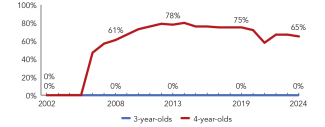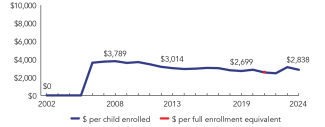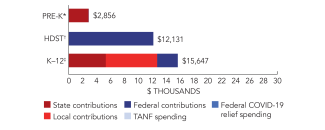
State of Preschool
Florida
Access Rankings
Resource Rankings
Total Benchmarks Met
Overview

During the 2023-2024 school year, Florida preschool enrolled 152,877 children, a decrease of 2,791 from the prior year. State spending totaled $431,872,667, and an additional $1,931,802 in federal recovery funds supported the program, down $52,952,921 (11%), adjusted for inflation, since last year. State spending per child (including federal recovery funds) equaled $2,838 in 2023-2024, down $289 from 2022-2023, adjusted for inflation. Florida met 5 of 10 quality standards benchmarks.
What's New

During the 2023-2024 program year, the Florida Department of Education adopted a new methodology for calculating a Voluntary Prekindergarten (VPK) provider’s performance metric using a combination of data points which include program assessment composite scores, student learning gains from the initial and final progress monitoring results, and student learning outcomes. The VPK Provider Performance Metric and designations will be used to determine how well VPK programs prepare students to enter Kindergarten ready and will be applied for the first time at the end of the 2024 program year. Data gathered from both the coordinated screening and progress monitoring and program assessments will be used to increase knowledge and skills of early learning professionals through targeted professional learning and coaching supports. Beginning with the 2023-2024 program year, VPK programs must receive a program assessment score of 4.00 or higher on the CLASS observational tool to be eligible to contract in the following program year.
Starting in 2024, summer VPK programs are required to assess children twice: once in the beginning of the program and once at the end (rather than the previous 3 times requirement). This policy change supports the administration of the coordinated screening and progress monitoring program in the 300-hour summer program. VPK children not yet on grade level are now eligible for the New Worlds Reading Initiative, which delivers a free book and activity each month of the school year to a student’s home to strengthen their literacy skills, build reading confidence and foster a lifelong love of reading. New Worlds Scholarship Accounts, worth $1,200 each, will be available to VPK children who exhibit a substantial delay in early literacy or mathematics skills based on the coordinated screening and progress monitoring assessment. Scholarship accounts may be used to purchase instructional materials, curriculum, part-time tutoring, summer and after-school programs designed to improve literacy or mathematics skills.
Background
Florida’s Voluntary Prekindergarten Education Program (VPK) was launched in 2005 after voters in 2002 approved a constitutional amendment providing prekindergarten access for all 4-year-olds. Parents may postpone enrollment of young 4-year-olds in the VPK program for a year, consequently making some 5-year-olds eligible. The program is managed by the Florida Department of Education, Division of Early Learning (DEL). Age-eligible children are enrolled in either a 300-hour summer program, which every school district is mandated to offer, or a school-year program totaling 540 instructional hours. Teachers in the school-year program are required to have at least a CDA credential or equivalent credential. Teachers in the summer program are required to have a bachelor’s degree.
VPK is provided in a variety of settings such as public schools, accredited nonpublic schools, licensed child care centers, accredited faith-based centers, and licensed family child care homes. Most children attend VPK in nonpublic school settings. Regional early learning coalitions monitor programs for compliance and administer VPK, distributing funding based on a fixed hourly rate. Programs are required to meet the Florida Early Learning and Developmental Standards: 4 Years Old to Kindergarten, which were most recently revised in 2017. Florida’s School Readiness Program is a separate initiative, funded by CCDF. The program offers financial assistance for childcare to qualified parents. This report focuses solely on the VPK program.
Florida Voluntary Prekindergarten (VPK) Education Program
Access
Resources
| Total state pre-K spending | $433,804,469 |
| Local match required? | No |
| State Head Start spending | $0 |
| State spending per child enrolled | $2,838 |
| All reported spending per child enrolled* | $2,856 |

*Pre-K programs may receive additional funds from federal or local sources that are not included in this figure. †Head Start per-child spending includes funding only for 3- and 4-year-olds. ‡K–12 expenditures include capital spending as well as current operating expenditures.
Florida Quality Standards Checklist
| Policy | Requirement | Benchmark | Meets Benchmark? |
|---|---|---|---|
For more information about the benchmarks, see the Executive Summary and the Roadmap to State pages. | 5benchmarks met | ||
| Early Learning & Development Standards Benchmark | Comprehensive, aligned, supported, culturally sensitive | Comprehensive, aligned, supported, culturally sensitive | |
| Curriculum Supports Benchmark | Approval process & supports | Approval process & supports | |
| Teacher Degree Benchmark | BA (summer); CDA or equivalent + specified training (school year) | BA | |
| Teacher Specialized Training Benchmark | ECE, Elem. Ed., Other (summer); CDA (school year) | Specializing in pre-K | |
| Assistant Teacher Degree Benchmark | None | CDA or equivalent | |
| Staff Professional Development Benchmark | 15 hours in 1st year, 5 hours/5 years after 1st year (teachers only); PD plans (teachers & assistants on probation) | For teachers & assistants: At least 15 hours/year; individual PD plans; coaching | |
| Maximum Class Size Benchmark | 12 (summer); 20 (school year) | 20 or lower | |
| Staff to Child Ratio Benchmark | 1:12 (summer); 1:11 or 2:12-20 (school-year) | 1:10 or better | |
| Screening & Referral Benchmark | Vision, hearing, health & more | Vision, hearing & health screenings; & referral | |
| Continuous Quality Improvement System Benchmark | Structured classroom observations; Data used for program improvement | Structured classroom observations; data used for program improvement | |
